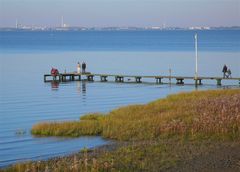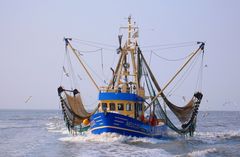Students
Research and studying at the ICBM
- The oceans are the institute's object of research
- Three sections shape the research at the ICBM
- What can you study at the ICBM?
The oceans are the institute's object of research
The coastal waters of the world are of great importance: They are home of several hundreds of millions of people worldwide. About 80 per cent of all fish is caught in coastal waters. Coastal habitats are very productive. Here, vast amounts of nutrients, carried by rivers and currents, support the life of thousands of marine organisms and, last but not least, of humans. Ever since the institute's establishment in 1987, scientists at the ICBM have focused their research on coastal environments, paying special attention to those regions and shallow seas lying right on the doorstep: The Wadden Sea UNESCO World Heritage Site, the German Bight and the open North Sea. At the institute, researchers of diverse backgrounds — biologists, chemists, mathematicians, oceanographers and geologists — closely work together. For only by combining the views of all disciplines, can one understand the complex processes occurring in the sea. Bacteria, for example, metabolise nutrients within the water and the sea floor, thereby making them available for algae. However, they also serve as food for higher organisms such as worms. Where do the nutrients, molecules and other substances in the water and sea floor come from? How are they chemically modified? Where are they deposited and how do they enter the food web? How do wind, waves and currents transport the sediments? How do the habitats change due to this action? Using complex computer simulations, the researchers at the ICBM try to understand how these factors interact and how they influence marine life, a key aspect being how climate change will alter the well adjusted biochemical processes. The scientists also explore how environmental pollutants affect life in coastal waters. Since large parts of the scientific findings also apply for other coastal and marine areas, many researchers at the ICBM are involved in international projects and work on other marine regions of the world.
Three sections shape the research at the ICBM
The ICBM's interdisciplinary work rests on three pillars: First, the section of Geochemistry and Analytic(s) is mainly concerned with the natural chemical processes occurring in the water and the sea floor. The scientists also explore the effects of mineral oil and other pollutants. The second pillar is the section of Geobiology and Ecology. Here, researchers deal, among other topics, with the metabolic processes of those organisms — bacteria and other plankton — that form the base of the marine food web and thus all life in the sea. Thirdly, the researchers of of the Physics and Modelling section try to find out, how marine currents shape life at the sea floor. They develop mathematical models describing how the various organisms interact in the Wadden Sea and other habitats. Why are some areas rich in species and others more uniform? What happens if alien species invade the habitats? In addition, the researchers want to understand how the major marine and air currents have changed in the course of time - and how they will change due to global warming. Key questions are how sea level rise, increased risk of storm surges or altered marine currents may affect the coastal regions.
There is also a research platform in the Wadden Sea which permanently records data such as temperature and salinity, thus adding valuable information to investigations on environmental changes.
What can you study at the ICBM?
The ICBM is an integral part of the University of Oldenburg and thus the only university-based marine research institute in Lower Saxony. Prospective students, interested in marine sciences, can choose among four different Bachelor and Master Programmes.
- The Programme Environmental Sciences provides students with a first profound insight into environmental and scientific topics as well as environmental planning. The programme introduces current scientific questions and provides information on current environmental issues including problem solving strategies. Terrestrial and marine systems are equally represented.
- The Master Programme Marine Environmental Sciences deals with modern environmental and marine research, focussing on coastal and shallow seas research, marine microbiology as well as climate and earth system research. The programme both conveys essential theoretical background as well as gives insight into the research routine. Students learn to know methods of data processing and modern instruments for chemical and microbiological environmental analysis. The aim is, to teach students to work independently on complex research questions. Here, working in a team is particularly important. In addition, students learn to effectively communicate and publish basic scientific principles and their own research results.
- During the Master Programme Environmental Modelling students learn to develop and use mathematical models and methods of data analysis for environmental research. The programme imparts knowledge on various scientific disciplines and methods of modern environmental modelling, environmental data analysis and environmental informatics. Sustainable economy is also taught. The students gain general insight into environmental systems and learn to combine their knowledge with economic and social issues.
- The Master Programme Microbiology is taught through English and introduces the students to current research topics. At present, participants have the opportunity to work on the international project dealing with the important bacterial group Roseobacter. In Oldenburg, various aspects of this global research programme are tackled. Students thus gain insight into professional field work, molecular biology and even environmental protection. After the Master Programme, the students may pursue a PhD thesis.
- In the Master's Programme Marine Sensors students get to know sensors and measurement methods for marine issues. Courses on the functioning of sensors as well as on measurement methods and data acquisition systems and models are provided, e.g. through practical training on research boats and the measurement platform located near Spiekeroog. In addition, the students are introduced to scientific work, e.g. in courses on graphical processing of measurement data and project management.

![[Translate to English:]](/f/5/_processed_/3/2/csm_ICBM-Logo-transparent-_91fe1c6774.png)

